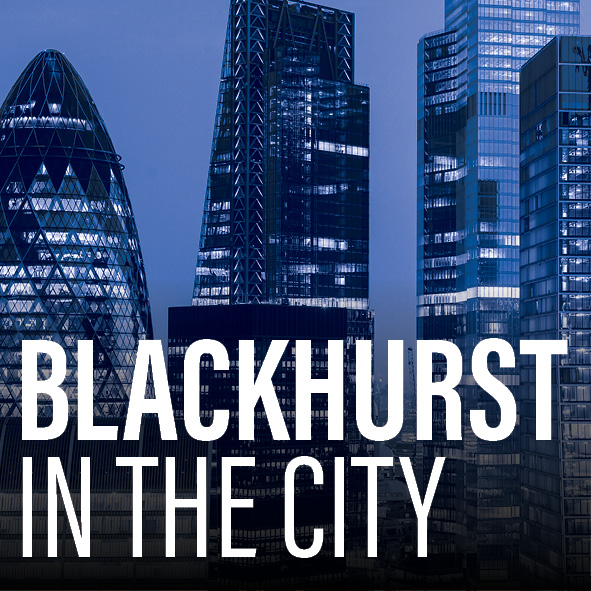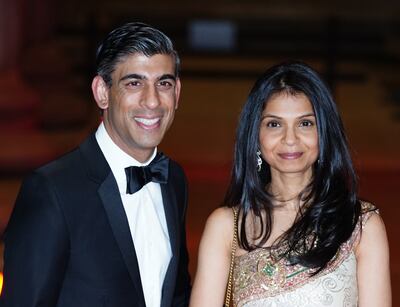
Britain is in “eat the rich” mode. The going has got tough and media and politicians are turning on those with money.
We’ve been here before — every so often the old "class war" rallying cry is raised, usually when household bills increase and those in charge are powerless to help. Short of ideas, they hit out at the softest target they can find.
This time it’s Rishi Sunak. Apparently, he is not fit to be Chancellor of the Exchequer because he has appeared, courtesy of his wife being the daughter of one of India’s wealthiest men, on the Sunday Times Rich List.
No one bothers of course, to wonder why the Sunaks did not appear on the ranking before — it’s not as if they’ve suddenly come into a fortune. Little has changed in their circumstances but, this year, they’ve joined the richest hit parade.
What has happened, of course, is that Mr Sunak has attracted controversy for having possessed a US immigration “green card” and for Mrs Sunak being a non-domicile for tax purposes. Now he is named on the Rich List.
Cue rage that he is unsuited for his job since he has little notion of what it must be like to struggle to get by.

It’s a nonsense of an argument, not least because previous holders of his office have been well-off — admittedly not as blessed as the Sunaks, but does it matter if you’re a multi-millionaire or a multi-multi-millionaire? You’re still in a better position than most people. And that was certainly true of Sajid Javid and George Osborne to cite two well-heeled recent incumbents.
When Tony Blair was in Downing Street, I did not hear his Labour colleagues shouting that as he hailed from a family of means — he went to Scotland’s equivalent of Eton — and as his wife was a QC, he should not be prime minister. It is also the case that MPs, Labour ones as well, versus most of the population, lead subsidised, well-paid lifestyles.
These though, are the politics of envy. So, woe betide any minister who gives an interview without knowing the price of a pint of milk or loaf of bread.
Windfall targets

Along with not-so-poor Rishi, the other source of opprobrium is the big fuel companies. They’re making oodles of profits from supplying us with oil and gas, while our fuel bills have climbed 70 per cent in the past year, and are likely to soar higher. This is having a knock-on effect everywhere, pushing up costs across the board and sending inflation to 9 per cent.
Meanwhile, the likes of BP and Shell are enjoying bumper earnings — Shell’s profits have tripled to £7.3bn. They must be made to pay, they’re reaping the benefit of sanctions, the argument goes, so hit them with a windfall tax.
There is a case as well that says that when private corporations suffer, they turn to the public purse for assistance — witness the bank bailouts in 2008 and the government’s measures to soften the blow of Covid. Therefore, when they strike lucky, they should cough up.
It’s not without precedent. One-off taxes were imposed in 1981, 1997 and 2011. To the chagrin of Conservatives who argue against the use of such a levy, on the grounds it is “unconservative”, the first and third of those charges were brought by Tory administrations and the 1981 tax was championed by no-less a Conservative than Mrs Thatcher herself.
Yes, they acknowledge, but she was in a difficult position, trying to manage the economy of a country that alone among other nations was suffering from rising inflation and rampant industrial unrest.
A panacea but PR

Today is different — the UK is in the same boat as its peers and the fuel companies’ bonanza is down to policy, to countries agreeing to embargoes.
Putting the ideological back and forth on one side — and it is a debate that the anti-taxers appear to be losing, with a YouGov poll suggesting seven out of ten Tory voters favour the tax — the charge has been elevated to an unwarranted status.
Like Mr Sunak’s suitability for office in hardship, the windfall tax has become a panacea. Get rid of Rishi and replace him with someone who hails from poverty and everything will be fine; clobber the oil and gas companies and, likewise, hey presto, all our troubles will disappear.
It's nonsense. Labour is proposing a tax that will raise £2bn. That seems low and there is talk it could net £4bn. But that is still nothing in the scheme of things. What it does do, though, is send an enormous global signal, that despite all our talk of wanting to attract international corporations and wishing them to have faith in the UK, we’re not on their side.
We’d be whacking them with a windfall tax at exactly the moment we’re asking them to invest in green energy projects, to help Britain achieve its “net zero” objectives. It’s not a good look. All it does is make lenders think twice about lending against these ventures and charge more or pull out on the basis we’re not to be trusted.
It was only two years ago that the same companies were racking up large losses, when the pandemic struck. The independent Office for Budget Responsibility calculates the UK fossil fuel energy producers will pay 20 times in tax this year, compared to what they paid in 2020. That year, at the outbreak of the pandemic, fuel prices crashed and producers sustained losses.
It’s PR, I know, but nevertheless Shell claims that in the most recent normal year, unaffected by Covid, the UK industry’s effective tax rate was 35.5 per cent, while in other developed countries it averaged 23.5 per cent.
Sticking another layer on top is petty and shows the UK is not serious when it comes to wooing business and promoting enterprise. They should be allowed their gains but be reminded that we treated them generously and in return, we expect their support.

